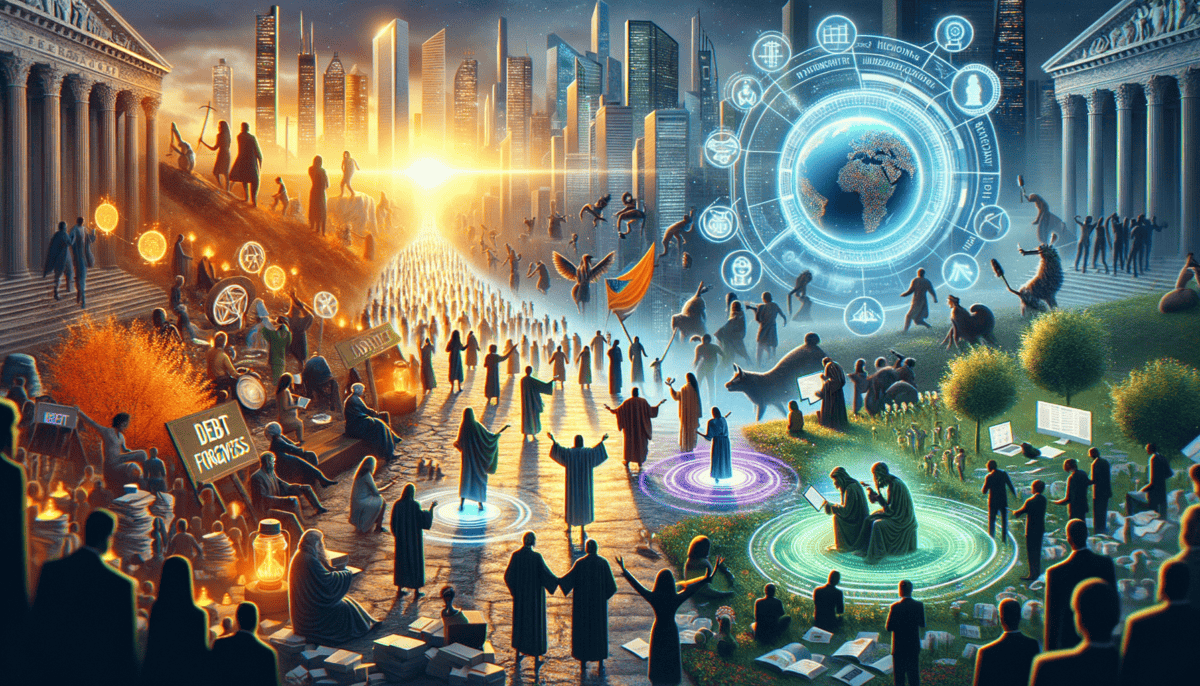The Seeds of Mercy
Long ago, in a dusty town called Jerusalem, people were worried about money. They owed coins to others and didn't know how to pay them back.
Jesus saw how scared and sad they were. He wanted to teach them about being kind when others owe us things. So he told them a special story that we still remember today.
"Listen," Jesus said to the crowd. "There once was a king who had a worker who owed him lots and lots of money. The worker owed more coins than anyone could count!
The king wanted his money back. But the worker had nothing to give him. He was so worried that he fell to his knees.
"Please," the worker begged, "give me more time! I will pay everything back!"
The king looked at his worker. He saw how scared the worker was. Then something amazing happened – the king's heart grew soft with kindness.
“You don’t have to pay me back,” the king said. “I forgive all your debt. You are free!”
The worker was so happy! He jumped up and down with joy. But then he did something not very nice. He saw another worker who owed him just a few coins.
Instead of being kind like the king, he grabbed the other worker and shouted, "Pay me back right now!"
When the king heard about this, he was very sad. He had shown great kindness to the first worker, but that worker didn't show the same kindness to others.
What Jesus Taught Us
This story teaches us something very important:
• When someone forgives what we owe, we should also forgive others
People started thinking differently about money after hearing Jesus' story. They learned that being kind about debts could make everyone's lives better.
In the markets and streets of Jerusalem, people began helping each other more. If someone couldn't pay right away, others would often say, "That's okay, take your time" or even "Don't worry about it."
This new way of thinking spread from town to town. It was like a tiny seed that grew into a big tree of kindness. People realized that having a kind heart was worth more than having lots of coins.
The story Jesus told became famous all around the world. Even today, thousands of years later, it helps us think about being fair and kind when it comes to money.
Rich people started thinking about how they could help poor people. Poor people felt less scared about owing money. Everyone began to understand that showing mercy was more important than getting every coin back.
Little children learned this lesson too. They shared their toys and treats, just like grown-ups shared and forgave debts. It made everyone happier!
Every time someone forgave a debt, it was like dropping another seed of kindness into the ground. These seeds kept growing and growing, making the world a better place – one act of forgiveness at a time.
Medieval Jubilees and Hope
Many years after Jesus taught about forgiving debts, something amazing started happening in towns across Europe. People came up with a special idea called “Jubilee.”
A Jubilee was like a big party where debts were forgiven. Imagine if your friend said, “You don’t have to give back that toy you borrowed!” That’s how happy people felt during Jubilee!
In medieval times (that’s the time of castles and knights), the Church helped make these Jubilees happen. Every 50 years, they would say:
“It’s time to start fresh! All the money people owe each other – let’s forget about it and begin again!”
How Jubilee Helped People
Here are some ways Jubilee made life better:
• Poor farmers could keep their farms
• Hungry families could buy food again
• People in debt could start new jobs
• Everyone felt more hopeful about the future
Little Tommy was a farmer’s son. His family owed lots of money for their farm. During Jubilee, all that money they owed went away!
The whole town would celebrate together. People would dance in the streets. Neighbors would share food. Everyone felt like one big family!
Kings and queens learned that when people weren’t worried about owing money, they worked harder and were happier. The towns grew stronger because everyone helped each other.
Sometimes, rich people didn't like Jubilee. They wanted to keep all their money. But most people saw how it made life better for everyone.
In some places, they even rang big bells to tell everyone Jubilee was starting. DONG! DONG! DONG! The sound meant hope was coming!
Stories of Joy
Maria was a baker who couldn’t buy flour because she owed too much money. During Jubilee, her debt went away. She baked bread again and gave extra loaves to hungry children.
John was a carpenter who lost his tools because of debt. After Jubilee, he got them back! He made chairs and tables for everyone in town.
People wrote songs about Jubilee. Children sang them while playing in the streets. The songs reminded everyone that helping others is important.
Even after Jubilee ended, people remembered to be kind about money. They learned that giving others a second chance makes everyone happier.
These medieval Jubilees showed that when we work together and forgive debts, amazing things can happen. Towns grew stronger, people felt safer, and hope filled everyone’s hearts.
The Age of New Ideas
As time moved forward, smart people started thinking differently about money and debt. They lived in a time called the Enlightenment, when everyone was getting new ideas!
Meet Sarah, a girl who loved to read. One day, she found her grandpa’s old books about money. “Why do some people have so much while others have so little?” she asked.
New Ways of Thinking
People called “philosophers” (that’s a fancy word for deep thinkers) had some cool ideas:
• Everyone should have a fair chance to earn money
• Debt shouldn’t last forever
• People should help each other more
• Money rules should be fair for everyone
Thomas was a writer who lived in France. He wrote: “If we help people who owe money, they can do better things with their lives!”
Changes Around the World
All over the world, people started talking about making money rules better. In England, a man named Adam wrote about how to make trading fair for everyone.
In America, Benjamin Franklin said, “A penny saved is a penny earned!” He wanted to teach people how to be smart with money.
Little by little, things started to change. Instead of just rich people making all the rules about money, more people got to have a say! ️
Stories of Change
Jack was a farmer who had great ideas about growing food. The new banks helped him buy seeds, and soon he grew enough food for the whole town!
Mary wanted to make dresses. Thanks to new rules about money, she could borrow a little bit to buy cloth and needles. Soon she had her own dress shop!
“When we help each other with money,” Mary said, “wonderful things can happen!”
Learning Together
Schools started teaching children about money. They learned:
How to save money wisely
Why helping others is important
How to be fair when trading
People wrote new laws about money and debt. These laws said everyone should be treated fairly. No more keeping people in jail just because they owed money! ⚖️
Newspapers started writing about these new ideas. Even kids like Sarah could read about them and understand why they were important.
Hope for Everyone
The best part was that people started believing things could get better. They saw that when money rules are fair, everyone has a chance to do well!
These new ways of thinking about debt and money helped make life better for many people. Instead of debt being something scary, it became a tool to help people grow and succeed.
Workers Stand Together
The world was changing fast! Big factories filled cities with smoke and noise. More people worked in these factories than ever before. But many workers had big money problems.
The Factory Life
Meet Tommy, a young worker in a big cotton factory. He worked long hours with many others. The work was hard, and the pay was small. Many workers owed money to the factory owners.
“This isn’t fair!” Tommy said one day. “We work so hard, but we can never save enough money!”
Workers Join Together
The workers had a great idea – they would work together! They formed groups called unions. In unions, workers helped each other when times were tough.
“When we stand together,” said Rosa, a union leader, “we are stronger than when we stand alone!”
Here are some ways unions helped workers:
• Asked for better pay
• Fought unfair debt rules
• Made sure children didn’t have to work
• Helped sick workers with money
Stories of Brave Workers
Lucy worked in a cloth factory. When the owner tried to lower wages, she helped organize a peaceful protest. The workers won better pay!
In mining towns, workers fought against the “company store” system. These stores charged too much money and kept miners in debt. ⛏️
Changes Around the World
Workers in different countries started sharing ideas. They learned from each other about fighting unfair debt.
In England, factory workers won new laws about fair pay. In America, miners fought for the right to be paid in real money, not company coins.
Better Days Coming
Little Mary’s dad was a factory worker. Thanks to the unions, he now earned enough to send Mary to school.
Tommy could finally save some money. He didn’t have to shop at the expensive factory store anymore. He could buy food wherever he wanted!
“Now we can save for our futures,” Tommy smiled. “Our children will have better lives!”
New Ideas Spread
People started writing about workers’ rights in newspapers. Even rich people began to understand that workers needed fair treatment.
Schools taught children about unions and workers’ rights. They learned how working together could make life better for everyone!
Workers kept fighting for better lives. They showed that when people join together, they can break free from unfair debt and build a better future. The fight wasn’t over, but things were getting better!
New Ways to Fight Debt
Today, people are still working hard to help others with money problems! Let’s meet some heroes who are making big changes.
Students Speak Up
Sarah just finished college. Like many students, she borrowed money for school. “The loans are so big!” she says. “It’s hard to start my life.”
Sarah joined a group that helps students. They use computers and phones to connect with others who want to fix the student loan problem.
“Together, we can make school cost less,” Sarah tells her friends. “Everyone deserves a chance to learn!”
Helping with Hospital Bills
Meet Doctor James. He saw many people worried about paying for doctor visits. So he started a special group to help!
His group buys people’s hospital bills for less money. Then they tell people, “Don’t worry about paying – your bill is gone!”
People Power Online
The internet helps people work together in new ways! Here’s what they do:
• Share stories about debt problems
• Start online groups to help each other
• Ask leaders to change unfair rules
• Raise money to help pay off others’ debts
Maria uses her computer to teach people about money. “Knowledge is power!” she says. “When we learn about money, we make better choices.”
Help Around the World
People in different countries work together to fight big debts. They use phones and computers to share ideas.
New Ideas Growing
Young people like Alex are thinking of new ways to help. He made an app that helps people save money and avoid debt.
“Technology can help us fix old problems in new ways,” Alex explains with a smile.
Community Power
In cities and towns, people start local groups to help neighbors with money problems. They have special events where experts give free advice!
Lisa runs a community bank that helps people save money. “When we help each other, everyone wins!” she says.
Moving Forward
More people join the movement every day. They use social media to spread the word about helping others with debt.
Teachers, doctors, students, and workers – everyone has ideas about making things better. They show that caring about others still matters today! ❤️
The fight for fair money rules continues. But now we have new tools and more ways to help each other than ever before!
A Better Money Future
The sun rises on a new day! Let’s peek into tomorrow and see how people are building a world with less money worries.
Smart Money Tools
Maya sits at her computer, smiling. She just made a new program to help people avoid debt. “Look what it can do!” she says to her friend Tom.
“The app tells you when to save money and warns you if you might get into trouble!” Maya explains proudly.
Different Ways to Share
People are trying new ways to use money. Some towns even make their own special money that neighbors share! ️
In one city, Carlos started a time bank. “I help fix your bike, you teach my kid math. No money needed!” he says with a grin.
Working Together
All around the world, people join hands to help each other. Here’s what they do:
• Share things instead of buying new ones
• Trade skills and time
• Start community gardens
• Help neighbors save money
Fair Money Rules
Young leaders like Jenna work to make money rules fair for everyone. She talks to city leaders about helping people with debt.
“Everyone deserves a chance to live without worry about debt,” Jenna tells them.
Teaching and Learning
Schools now teach kids about money in fun ways. Miss Kim’s class plays games to learn about saving. “Understanding money early helps you make good choices!” she says.
Hope for Tomorrow
From Jesus’s time to today, people have always helped others with money problems. Now we have new ways to help!
The story of debt forgiveness keeps growing. More people join every day to make the world better. They show that kindness and helping others never goes out of style! ❤️
Just like Sarah helping students, Doctor James helping sick people, and Maya making smart tools – you too can be part of making money fair for everyone!
The journey that started long ago with simple acts of forgiveness now spreads hope across the whole world. Together, we’re building a future where everyone has a chance to live without heavy debts!
“The best way to help yourself is to help others. That’s what makes our world special!” – Maya
And so our story of helping others with money problems continues to grow, bringing more light and hope with each new day! ✨






